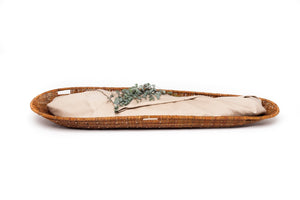Cremation or burial without a coffin
By law, it is not mandatory to be buried or cremated in a coffin. The only requirement is that the body is covered, and for cremation, a flat bottom surface and a raised edge is required. This is because otherwise the cremation input system does not work. When a carrier design you like doesn't have these features, you can use a Cremation input board. More and more people prefer this alternative, since it helps you o say goodbye in a soft and accessible way. Even though we are used to using a coffin at a funeral, the need for a more personal alternative is growing.

A softened cover
The reason the body must be covered is that it must be possible to move it hygienically. On the way to a funeral or cremation, the body must sometimes be lifted, and in this case it is necessary that the body is covered. For this, a biodegradable shroud can be used. Once shrouded, the body is placed on a carrier (or stretcher) so that it can be lifted properly during transport and during the ceremony.
Why cremate or bury without a coffin?
Although a coffin seems to be the most common covering for burying someone, for some people, the idea of a coffin is confining or even scary. With this thought, death itself becomes frightening, while it does not have to be. For a more personal and warm transition from the deathbed to the final resting place, people can opt for a shroud. Being shrouded in soft fabric, the body is neatly covered, but still approachable. In addition, the ashes of a shroud and stretcher are much less than the ashes of a full, solid coffin. As a result, the ashes that eventually end up in the urn contain less impersonal remains.
Farewell without a coffin
The option of using a shroud and carrier has existed for years, and has been generally permitted since 1998. However, many people are still unfamiliar with this alternative. You often only come into contact with the possibilities surrounding a funeral when the moment is already there. At such a moment, it is easier to choose something you are already familiar with. However, as soon as people hear about this more personal option in advance, interest immediately grows.

What is a carrier?
Carriers, also called stretchers, are designed to replace a coffin at a funeral. During a wake or funeral ceremony, the body, wrapped in a shroud, is placed on this carrier. These stretchers are made with recesses on the side so that they can be lifted. There are carriers made of willow twigs, willow branches or bamboo, and hard wooden carriers that can be painted if desired.
What is a shroud?
A shroud, also known as a funeral shroud or burial shroud, is a fabric that you can wrap around the body for a gentle farewell. You can make this shroud as personal as you wish. It can be painted on and mementos such as notes or flowers can be placed in the folds.
Folding a shroud
When you organize a funeral without a coffin and use a shroud, you can shroud a loved one yourself. This is a beautiful symbolic ritual at the beginning of the grieving process. Step by step, you tuck a loved one in. Since the extent to which the shroud is left open is up to you, this farewell ritual can be performed at your own pace. The shroud can be folded further and further each day, or you can pick a single moment with an intimate group.

Sustainable and naturally degradable
Choosing a farewell without a coffin also opens the way to sustainability. We make our shrouds from sustainable and organic materials. The same applies to the wood of our carriers. For example, we use bamboo sticks and willow twigs, completely natural materials that are biodegradable.
The road to sustainability
There are a number of regulations associated with organizing a cremation without a coffin, such as the body being covered in such a way that they can be transported and carried hygienically. If a shroud and a carrier are used, a Cremation input board is sometimes required. This is because not all designs have a flat bottom and raised edge, which is mandatory for the cremation oven. Always consult with the crematorium you have in mind.


